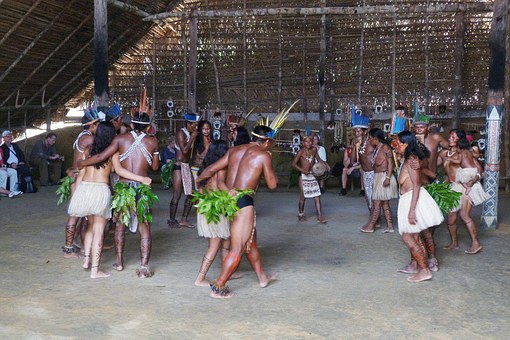As I ate chicken and rice at a cafe in La Paz, Bolivia a German man, who blocked the sunlight dazzling on my beer bottle, stood over me and with a rueful and easy smile and asked me if I wanted to find a lost tribe of cannibals deep in the Amazon. I was a Masters student in Anthropology at Columbia University and had been traveling in South America for two weeks polishing my Spanish and learning some indigenous languages. My father, an oil executive, was funding my trip. I had been in La Paz for a few days gazing at the Andes and photographing the people, mostly Aymara and Quechua.
I laughed. “A lost tribe? Cannibals? I don’t think so.” Something in me, however, was set on fire thinking about it. The Amazon always wove into my girlhood dreams of exploration.
“It’s true.” He sat down and pushed a photograph to me. There were Indians roasting a man who was scorched. His skull was clearly human. “The man being eaten was an elder. They eat their own. Those that die. It’s not murder. But, I was told you have a fondness for languages and their language is unlike any I have encountered. Very unique.” I averted my gaze from the photo to the German man. He was of medium height, vivid blue eyes, wrinkles that formed around his eyes when he smiled, and a hardened, wiry body. A coil of tough energy. I figured he was in his 40s.
“How much?” I asked. He laughed and ordered drinks from the waiter. He didn’t answer but talked about Germany, his time on an oil rig in the Atlantic, working the docks in Liverpool, getting drunk and engaged in Buenos Aires, and becoming a guide in the Amazon. He didn’t want money. He wanted adventure and for someone to study the Indians he had discovered.
My father wired me money two days later and I bought supplies and gear with Hans. It never occurred to me not to trust Hans. The first two days were relatively easy considering we were in the Amazon. I was in awe over the plants, the insects, the animals in the trees and those scurrying on the ground. Hans and I had separate tents and he was friendly and professional. On the third day, we were caught in a deluge of rain.
“This isn’t even the rainy season,” Hans yelled. A jaguar followed us for a day and then Hans shot it. Hans killed various animals to eat but I stuck to rice, beans, and protein bars. Each day we went deeper into the Amazon and began following the river. I was tired, filthy and mosquito bitten. Hans checked my feet every day for jungle rot. After a week I grew impatient and irritable.
“How much farther?” I asked Hans. He didn’t answer but turned at a branching tributary from the Amazon. Deeper we went. I looked at the map. I couldn’t discern where we were at. That night I woke up in the middle of my slumber in my tent and discovered Hans standing outside staring down at me. He didn’t answer. Eventually he went back to his own tent.
“I’m done, Hans,” I said the next day.
“We are here,” he said. Up ahead I saw a large shack and in front of the shack was a strong fire. A woman was stirring a pot over the fire. The woman looked at us and didn’t smile. I thought I saw fear. She was white, tall, and very thin.
“Sarah,” Hans said. “Meet Jane. Jane is a student at Columbia.”
Sarah didn’t smile and shook her head. Hans roughly grabbed my arm and tied a rope around it.
“What are you doing?” I yelled.
“This is the end,” yelled Sarah.
Hans tied me to a post. “You’re part of my tribe now. My very own Amazon women.”
I screamed. “They were warriors. Not prisoners. I’ll escape.”
“You’ll never find your way back. You’ll die in one day out there. Alone.” Hans laughed. “We Westerners are strange. Always seeking savages. Fighting savages. Studying savages. We’re all just humans doing what we can to survive. Or like me creating my own life and my own tribe.”
Hans removed my gear from my shoulders. “Relax. You’re home now my lovely savage.”
[amazon_link asins=’0778774651,B009VVVMUQ,B06VXH2KZ5′ template=’ProductCarousel’ store=’200wordshort-20′ marketplace=’US’ link_id=’13c7fe00-1662-11e8-bee8-0d7b7700198d’]
